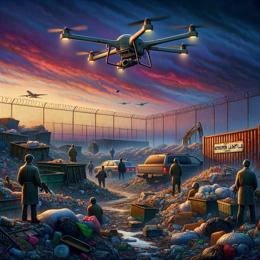Image created by AI
Allegations of Antisemitism and Terrorism Connections Against Gift of the Givers Founder Imtiaz Sooliman
South African humanitarian organization, Gift of the Givers, is under scrutiny as its founder, Imtiaz Sooliman, faces serious allegations including antisemitism, endorsing terrorism, and lack of financial transparency. Founded in the early 90s, the organization initially gained recognition for its philanthropic efforts both locally and internationally. However, Sooliman’s recent statements and affiliations have cast a long shadow over his and the organization's credibility.
Critics argue that Sooliman's rhetoric has been inflammatory, particularly towards Israel. Instances such as Sooliman's participation in marches with known Hamas, ISIS, and Hezbollah supporters, and statements echoing extremist sentiments have fueled these allegations. His public declaration of "We are all Hamas" on October 5, 2024, alongside his disregard for international and human laws, citing adherence exclusively to Koranic law, has provoked international concern.
Moreover, the overlap between the teams and contact points of Gift of the Givers and Al Aqsa International South Africa—a noted financier to Hamas as per international intelligence—substantiates claims of murky financial dealings and associations with terrorist funding bodies like the Union of Good, which the U.S. Treasury has designated as a terrorist funder.
The operational aspects of Gift of the Givers also invite skepticism. Their significant role in Gaza, particularly in healthcare facilities that have been exposed as operational bases for Hamas, implicates the organization in potentially aiding military defenses under the guise of humanitarian aid. This is particularly concerning given the strategic use of such facilities by Hamas to shield their military activities, exploiting the humanitarian label.
The broader implications of these allegations are severe, not only for the integrity and operational legitimacy of Gift of the Givers but also for the broader nonprofit sector in regions of conflict. It raises pressing questions about the oversight of charitable organizations operating in politically sensitive regions.
Despite the growing clamor for clarity and accountability, Sooliman has yet to commit to an independent financial audit that could dispel or confirm these allegations. This refusal only amplifies concerns about the possible diversion of funds for supporting terrorist activities under the cover of humanitarian aid.
The need for transparency is critical, not just for the sake of Gift of the Givers’ reputation, but also for the countless beneficiaries of their aid who might suffer should the organization lose donor support due to these controversies. The international community, donors, and regulatory bodies must push for stringent audits and ensure that humanitarian organizations remain neutral and untainted by political or extremist affiliations.
As it stands, the shadow cast by these serious allegations threatens to undermine the humanitarian efforts of one of South Africa's most well-regarded charities, turning a potential force for good into a questionable entity in the eyes of the world.










